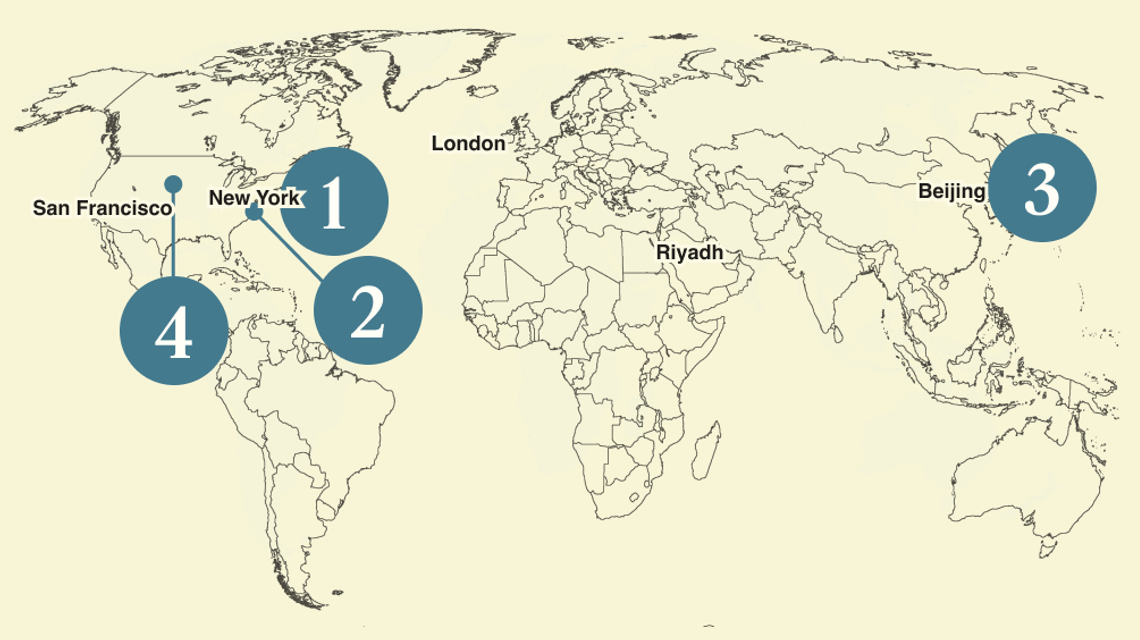| | In this edition, we look at the capital class’ reaction to socialist Zohran Mamdani’s win in the NYC͏ ͏ ͏ ͏ ͏ ͏ |
| |  | Business |  |
| |
|
 - NYC’s elites to the barricade
- ‘Shadow’ Fed chair
- Trump, steel magnate
- The US’ workers problem
 What to do when you’ve accidentally funded a coup |
|
 The capital class is freaking out. Socialist Zohran Mamdani’s win in New York City’s Democratic mayoral primary this week stunned the local elite, which had grudgingly but generously backed former Gov. Andrew Cuomo’s bid to prevent a leftward shift in their backyard. They are less exercised about Mamdani’s proposed millionaire tax than you might expect; taxes are high in Westchester and Greenwich, too. But they are deeply, intellectually offended by his plans to freeze rents, open city-run grocery stores, and otherwise have the government intervene in economic matters. “It’s officially hot commie summer,” hedge-fund manager Dan Loeb wrote on X. They see it as an assault on capitalism (Mamdani would agree!) and on their own noblesse oblige. And Wall Street’s powerful Jewish community remains as exercised as ever by Mamdani’s support for Palestinian protests. What had been an intensely local campaign that was unusual by today’s political standards quickly became, well, globalized. So the elites are now doing what elites do, this time in group chats instead of smoke-filled back rooms (or live on CNBC, which on Wednesday hosted a mini-writers’ room brainstorm for a Dark Knight plot). As we reported yesterday, they are swinging their support to Mayor Eric Adams, a flawed and deeply unpopular incumbent, and threatening to leave the city. Their threats may not be empty. A decade ago, it would have been unworkable, to say nothing of a bad look, for CEOs to flee while leaving their workforces behind. But other cities like Dallas and Miami have turned political fearmongering into credible relocation pitches, just as the state legislatures in Texas and Nevada have beckoned mainstream companies to redomicile there. “Companies go where they’re welcome,” John Boyd, who advises big companies and real-estate developers on where to locate new offices, told me in an interview from what he called “the new sixth borough” — Boca Raton, Florida. |
|
What NYC didn’t see coming |
 David ‘Dee’ Delgado/Reuters David ‘Dee’ Delgado/ReutersNew York City’s business community is organizing desperately around Mayor Eric Adams in an effort keep to Zohran Mamdani, a socialist with big tax and spending plans, from winning in November. Some of former Gov. Andrew Cuomo’s biggest backers hinted in fluid, panicked conversations Wednesday that they’ll put their money behind Adams, who is running as an independent after a federal corruption indictment that purged his inner circle and tanked his popularity. The business community was largely neutral on Adams, who they saw as a welcome, if occasionally tiring, return to moderation after the rich-baiting de Blasio era; they remain nostalgic for Mike Bloomberg’s three terms. “There is going to be overwhelming support in the business community to rally around Adams,” said Richard Farley, a partner at law firm Herbert Smith Freehills Kramer, who said he’s organizing a fundraiser for the mayor and has been speaking with some of Cuomo’s biggest donors. “This will be a street fight all the way to November.” Other executives mused about drafting a new candidate or rebranding one of this week’s runners-up who might look more attractive to centrists when stacked up against Mamdani — perhaps Whitney Tilson, the former money manager whose campaign got little traction but occasionally broke through with criticism of Mamdani; or Police Commissioner Jessica Tisch, who has repeatedly passed on more obvious opportunities to run. (Bill Ackman is promising a blank check to a credible write-in candidate.) Mamdani’s win “is not an endorsement of socialism but rather a rejection of the status quo, which threatens to bring on the kind of political instability that business hates,” said Kathy Wylde, CEO of Partnership for New York City. Room for disagreement: “Financial elites understandably terrified of a surging communist candidate are pouring their resources into propping up a deeply unpopular establishment incumbent in the final months of an election,” Alex Kliment, a writer at Ian Bremmer’s Eurasia Group, wrote on X. “Eric Adams is about to be Boris Yeltsin.” |
|
Trump wants Powell out, for real this time |
 Kevin Mohatt/Reuters Kevin Mohatt/Reuters“He goes out pretty soon, fortunately, because I think he’s terrible.” President Donald Trump ratcheted up pressure on Federal Reserve Chair Jerome Powell, saying he had a short list of names to replace him and sharpening previous hints he might announce a successor before Powell’s term expires next spring. Naming a “shadow” Fed leader was floated last year by Scott Bessent, who was at the time auditioning for his current job as Treasury Secretary. His mentor, the legendary investor Stanley Druckenmiller, quickly called it “a horrible idea and irresponsible.” Trump’s latest comments sent the US dollar to its lowest level in three years, though Treasury bonds held steady. Lowering interest rates, as candidates seeking Trump’s blessing have promised to do, would put downward pressure on the dollar by making US investments less attractive. |
|
Trump’s golden shares offer control, but no upside |
 Leah Millis/File Photo/Reuters Leah Millis/File Photo/ReutersThe US government’s “golden share” in the takeover (er, “partnership”) of US Steel by a Japanese company turns out to be a one-man veto. The final agreement between the Pittsburgh-based manufacturer, Nippon Steel, and the White House gives final say over day-to-day business matters to Trump, a power that reverts to the Treasury and Commerce Departments only when he leaves office. Liz’s View: A playbook that involves ceding effective control — but no economics — to Trump is a vexing prospect for executives, most of whom would rather share the spoils than the reins with an unpredictable president. Past instances of the US government exerting control over private companies have been during crises like the 2008 auto bailout and 2020 airline rescues, which blended a profit share and light operational influence. This is a whole new thing, and whether it ends when Trump’s term does or becomes a new arrow in the ever-expanding quiver of national-security regulators could shape the next decade of dealmaking. |
|
Where will workers come from? |
 Buildsubmarines.com Buildsubmarines.comThe US is getting, from an economic perspective, dangerously old. New data out today from the Census Bureau shows a sharply aging population that could exacerbate a shortage of workers, especially if the White House continues its crackdown on immigration. In 2020, there were just three states where adults over 65 outnumbered children; there are now 11, and the same is now true in nearly one-third of big cities. Companies are already having trouble filling skilled roles. So is the US Navy. The jobs most in demand — in construction, agriculture, health care, and hospitality — can’t yet be done well if at all by AI, even if people are using ChatGPT to self-diagnose in alarming numbers. |
|
Crypto’s 2022 collapse brought a brief respite from buzzword-as-business-model startups. (Never forget Long Island Iced Tea Blockchain Corp.) That break is over. Courtesy of Bloomberg: “A footwear startup is teaming up with two space companies to design a shoe in orbit as part of a mission to make artificial intelligence and blockchain less expensive and more eco-friendly than it is on Earth.” |
|
➚ BUY: Bezos. His star-studded wedding coincides with a new opportunity for his Blue Origin to cut into Elon Musk’s stranglehold on space contracts. ➘ SELL: Bloomberg. Mamdani’s win is both a personal blow to the former mayor, who donated more than $8 million to Cuomo’s campaign, and to the centrist, technocratic politics of the Bloomberg era. |
|
 Companies & Deals- Gremlin watch: Salesforce CEO Marc Benioff said 30 to 50% of the company’s work is being done by AI, giving an early proof point to Anthropic CEO Dario Amodei’s prediction that AI could soon wipe out half of all entry-level jobs.
- M&A murmurs: Oil giant Shell denied a report that it was in active talks to acquire BP. Companies sometimes obfuscate deal talks, but tend to take seriously UK takeover rules, which require honesty and would now temporarily limit Shell’s ability to pursue BP.
Watchdogs- No second act: Former Barclays CEO Jes Staley lost his bid to get unbanned from the UK’s financial industry, with a judge affirming that he “recklessly” misled the country’s Financial Conduct Authority about his relationship with Jeffrey Epstein.
- Right-hand jab: European Commission President Ursula von der Leyen faces a no-confidence vote from parliament over her failure to produce private messages exchanged with Pfizer’s CEO during Covid-era vaccine negotiations. Far-right lawmakers are leading the motion, which, although unlikely to succeed, threatens the president’s second-term agenda.
Markets- Hard data: Revised US GDP figures showed the economy shrunk 0.5% in the first quarter, more than early estimates and trending in a worrisome direction. Stripping out a rush of tariff-beating imports, the revision “suggests consumers were likely more on edge than previously thought,” said Daniel Hornung, former deputy director of the National Economic Council under the Biden administration.“Tariff whiplash meets fiscal fog,” is how EY-Parthenon’s chief economist put it.
- Soft data: “When all the signals are pointing the same way, I think we need to take the consumer seriously,” says the executive tasked with collecting the most salient piece of economic information in the world right now.
- Ping pong: Nvidia again became the world’s most valuable company, overtaking Microsoft.
- Chokehold chokepoint: Western companies are still having trouble getting rare-earth minerals from China, despite the trade deal between Washington and Beijing that should have lifted the gates.
- Quit your Karping: Shortsellers are throwing in the towel on Palantir. Once a popular bet among Wall Street’s bears, Palantir’s sky-high valuation has been backfilled, and to a degree justified by a more dangerous world and the spectacular demand lately for data and unmanned attacks.
|
|
|